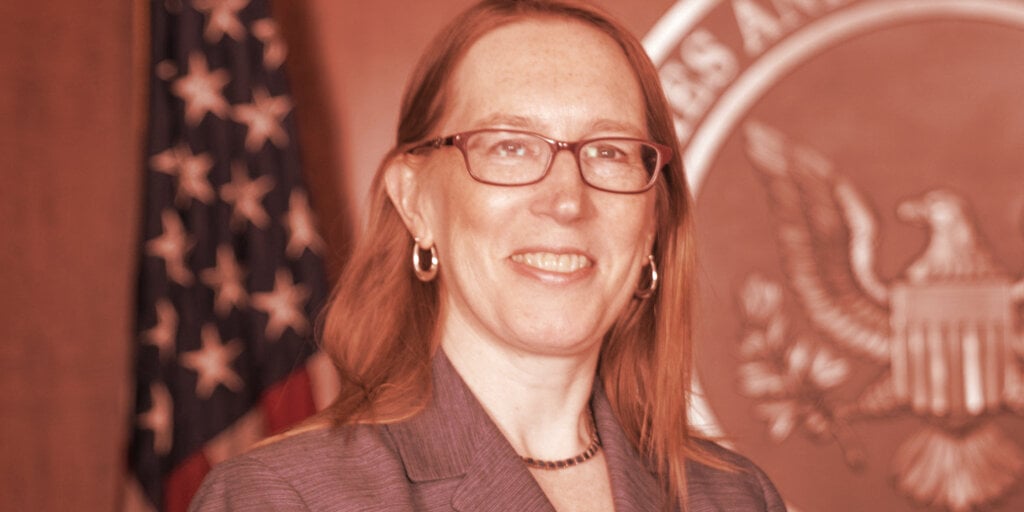Search
The Securities and Exchange Commission may be poised to crack down on the multi-billion dollar NFT industry—but one of its own doesn’t believe the SEC should be so quick to bring down the hammer.
The SEC, according to reports, is currently investigating Yuga Labs—the $4 billion company behind the Bored Ape Yacht Club—for securities violations. But the Commission has thus far issued zero statements regarding its position on NFTs specifically, leaving creators feeling uncertain and frustrated about how to navigate what they consider to be an ambiguous regulatory environment.
And they have a sympathetic ear within the SEC itself: SEC Commissioner Hester Peirce, affectionately known as “Crypto Mom” within the industry.
“I think the SEC has provided very little clarity [on NFTs],” Commissioner Peirce told Decrypt. “There's a lot of ambiguity. And in situations where there is this much ambiguity, I think people really need to be very careful. This is not the ideal state [of regulation].”
Peirce is one of five presidentially appointed commissioners in the bipartisan SEC, and she has long disapproved of the agency’s approach to crypto regulation in general—and now NFTs in particular.
“I’ve been saying this for two years,” said Peirce. “A good government approach is to lay out the law clearly. And then if people violate it, then you bring enforcement actions. You don't use enforcement actions to tell people what the law is. You should at least have a baseline of clarity.”
Peirce feels the SEC has taken the opposite approach when it comes to NFTs.“The SEC has taken the position that securities laws need only to be enforced for this area, not interpreted or modified,” she said.
NFTs are unique blockchain-based tokens used to prove ownership of digital assets which, over the last two years, have exploded in popularity.
In January of this year alone, the NFT market saw $5.36 billion in organic trading volume, coming off 2021’s record $25 billion in sales. Since May’s crypto crash, those massive figures have tapered off to roughly $1 billion in monthly NFT trading volume.
Still, major corporations like Meta and Twitter have recently rolled out NFT compatibility for their social media platforms, indicating a concession among the world’s largest tech companies that the novel technology is here to stay.
Peirce believes the SEC could easily provide a substantial amount of clarity to NFT creators as they navigate mainstream adoption, but the federal agency, for whatever reason, has chosen not to give that guidance.
“We could do that anytime we wanted. We have mechanisms for doing that,” said Peirce. “We could work on some kind of group exemptive order that could say, ‘If you meet these parameters, then you’ll be fine under the securities laws.’ We could set out parameters within which people could operate. We could draft some kind of a class no-action letter which says, ‘If you do these things, we’re not likely to recommend an enforcement action against you,’” she said.
“We could do that anytime we want to. But we're just not doing it,” said Peirce.
Beyond specific guidelines that might need to be adjusted for NFTs, Peirce told Decrypt that there are certain classic characteristics of securities that project creators ought to avoid in order to steer clear of violations.
“How close does it look to something that is in the traditional securities realm? Is it sharing in revenue of a project? Is it fractionalized and you’re selling pieces of that? Do you have some claim to assets underlying assets?” said Peirce. “You know, the same kinds of things that would mark something as being a stock or a bond.”
Peirce wouldn’t comment on whether any specific NFT project’s actions constituted a securities violation in her opinion. But she also did not rule out the possibility that generative, profile picture NFT collections such as BAYC, CryptoPunks, and Moonbirds could be classified as securities.
Those projects, and others like them, have racked up billions of dollars in secondary sales, but they purport to be art pieces that offer holders community perks and social utility and not investment products. Peirce stated that a determination as to the securities status of each of those collections would have to come down to case-specific “facts and circumstances.”
Other legal experts, such as University of Kentucky law professor Brian Fyre, previously told Decrypt that NFT collections like BAYC could very well be classified as securities—if the SEC chooses to go down this route. “What you’re buying is a piece of the Bored Ape Yacht Club, and the value of your NFT rises or falls along with the value of the Bored Ape Yacht Club brand,” Fyre said.
Peirce, for her part, said that it’s not for her to say. “It really would be more valuable for us, as a Commission, to come out with guidance that reflected the majority view at the Commission,” she said.
But if the manner in which Chairman Gary Gensler’s SEC has thus far approached crypto and NFTs is any indication, that guidance is not likely to come any time soon.

